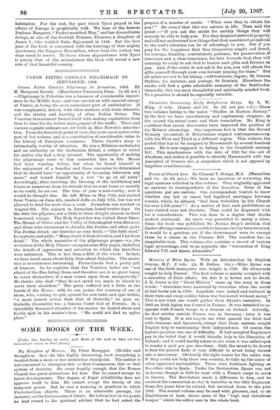Memoirs of Miles Byrne. With an Introduction by Stephen Gwynn,
M.P. 2 vols. (A. H. Bullen. 15s.)—Miles Byrne was one of the Irish insurgents who fought in 1798. He afterwards sought to help Emmet. The first volume is mainly occupied with a narrative of Irish affairs. On this it is better not to dwell. J. R. Green in his "Short History" sums up tile story in these words : "Atrocities were answered by atrocities when the revolt at last broke out in 1798. Loyalists were lashed and tortured in their turn and every soldier taken was butchered without mercy." This is not what one would gather from Byrne's narrative. In 1803 an Irish legion was formed in France. It was intended to co, operate with French troops in a descent on Ireland. Actually, its first service outside France was in Germany ; later it was sent to Spain. It is not easy to see what quarrel the Irish had with Germans and Spaniards, except that these nations sought English help in maintaining their independence. Of course, the legion's position was one of difficulty. It had accepted Napoleon's pay in the belief that it would thereby help in the liberation of Ireland; and it could hardly refuse to act when it was called upon to render a quid pro quo elsewhere. Still, the moral to be drawn is that the patriot finds it very difficult to avoid being turned into a mercenary. Obviously the right course for the exiles was, if they could not help their own country, to take up the cause of other oppressed nationalities. There were Irishmen fighting on the other side in Spain. Under the Restoration Byrne was not in favour, though in 1828 he went with a French corps to serve in Greece. The Revolution made a difference to him, and he received his commission as chef de bataillon in the 56th Regiment. Some five years later he retired, but survived down to the year 1862. The second volume may be read with pleasure, and, to an Englishman at least, shows more of the "high and chivalrous temper" which the editor sees in the whole book.






































 Previous page
Previous page